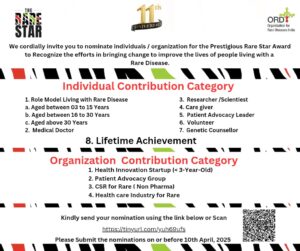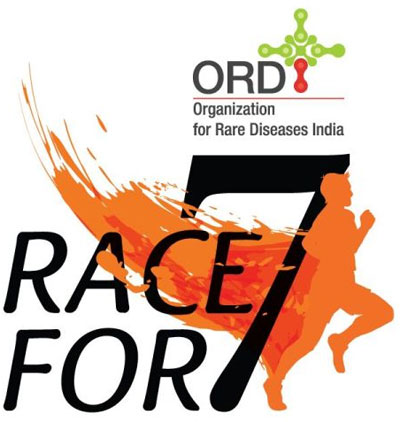Dr Meenakshi Bhat, a pioneering clinical geneticist at the Centre for Human Genetics in Bangalore, and a long-time supporter of the rare disease community urged the government to make it possible for eligible patients to receive sustained, continuous definitive treatment as well as supportive therapy.
Speaking at an awareness programme on rare disease, Dr Meenakshi said that under the National Rare Disease Policy 2021, every individual affected with a treatable rare disorder is eligible to Rs 50 lakh towards treatment costs. This amount is not sufficient for the patients as the cost of therapies is very expensive as India is completely depending on the imports of these therapies. Early diagnosis is a critical challenge in Rare Diseases (RD) management.
There are more than 7000+ RD known/reported world-wide. Over 350 million people world-wide are affected with RD (with ~30 million in USA, ~30 million in EU and ~70 million in India). About 80 per cent of RDs are genetic in origin many of them being monogenic. Only ~500 approved orphan drugs exist in the market and over one hundred in clinical trials. Majority of the diseases have no treatment and when they exist, are mostly unaffordable.
In India over 70 million patients estimated to be affected with one of more than seven thousand rare diseases. The number is increasing every year and it is estimated that 1 in 20 Indians is affected by a rare disease. In the US and EU, it takes about 5-7 years to diagnose a rare disease. Late diagnosis, subsequent delay in treatment and care only means small chance of survival and a poor quality of life for patients.
Government of India has identified 12 institutions which are actively managing patients suffering from rare diseases. These institutes designated as Centres of Excellence (CoE) include All India Institute of Medical Sciences, New Delhi; Maulana Azad Medical College, New Delhi; Sanjay Gandhi Postgraduate Institute of Medical Sciences, Lucknow; Postgraduate Institute of Medical Education and Research (PGIMER), Chandigarh; The Center for DNA Fingerprinting & Diagnostics with Nizam Institute of Medical Sciences, Secunderabad; King Edward (VII) Memorial Hospital and Seth Gordhandas Sunderdas Medical College, Mumbai; Institute of Post- Graduate Medical Education and Research, Kolkata; Center For Human Genetics (CHG) with Indira Gandhi Hospital, Bangalore; All India Institute of Medical Sciences, Jodhpur; Institute Of Child Health and Hospital for Children, Chennai; Government Medical College, Thiruvananthapuram and All India Institute of Medical Sciences, Bhopal.
Dr Meenakshi further noted that the Bengaluru Centre of Excellence for Rare Diseases (CoERD) (jointly between Centre for Human Genetics and Indira Gandhi Institute of Child Health) with over 300 rare diseases patients (highest anywhere in the country) from all over Karnataka are receiving specific therapies at no cost.
Link for Original Article : https://www.biospectrumindia.com/news/101/25710/rare-disease-patients-should-receive-sustained-continuous-definitive-treatment.html




